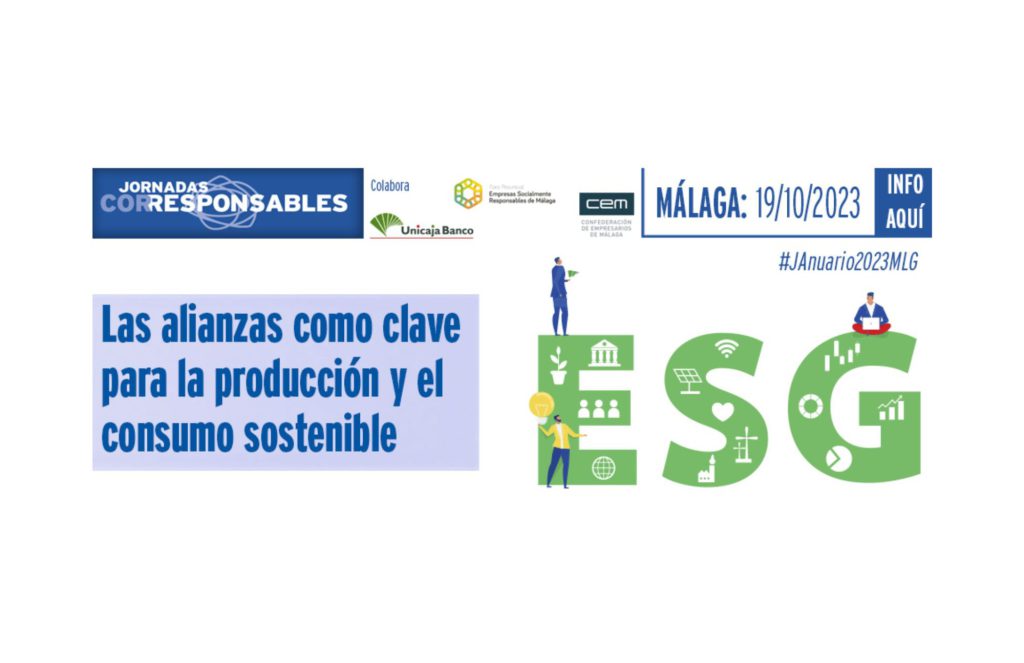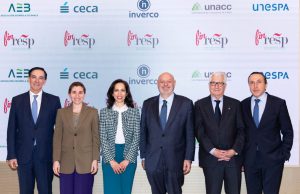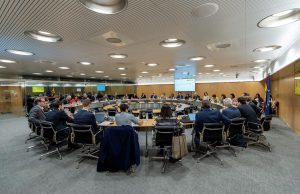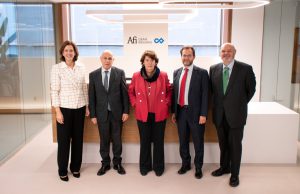Unicaja Banco's Assembly Hall hosted the Corresponsables Conference at which the 18th Corresponsables Yearbook was presented, an event featuring organisations such as Unicaja Banco, CECA, CEM, Edufinet, Bodegas Robles, Famadesa, Grupo Mayoral, Metrovacesa, Málaga CSR Forum, ACES Andalucía, Málaga City Council, University of Huelva, Málaga Marketing Club and DIRSE. The event had a huge impact on social media, with #JCorresponsablesMLG achieving more than 7 million hits and reaching more than 125,000 people.
This morning the Corresponsables Conference was held in Málaga, in the Assembly Hall of Unicaja Banco. The event, which was organised in collaboration with Unicaja, Empresas Socialmente Responsables de Málaga and CEM, brought together 14 organisations from all the leading stakeholders in sustainability, such as Unicaja Banco, CECA, CEM, Edufinet, Bodegas Robles, Famadesa, Grupo Mayoral, Metrovacesa, Málaga CSR Forum, ACES Andalucía, Málaga City Council, University of Huelva, Málaga Marketing Club and DIRSE.
The event had a huge impact on social media, with #JCorresponsablesMLG achieving more than 7 million hits and reaching more than 125,000 people. It also had more than 46,000 viewers via Twitter streaming.
Corresponsables, the media outlet, foundation and observatory, leader in responsible journalism and communication in Latin America, presented the 18th edition of the Corresponsables Yearbook at a conference held under the slogan: "Alliances as a key to sustainable production and consumption".
Inauguration
Inaugurating the event, José María López Jiménez, Director of Sustainability and CSR at Unicaja Banco, kicked off the Corresponsables Conference explaining that "the main challenge lies in how we interact with customers. We are talking about business model and supplier relationships, but this complex transition towards sustainability will succeed when customers can exercise their sovereign right to choose. Unicaja Banco wants to include the concept of sustainability in economic and financial education".
Miguel Gil, Director of Social Activities at Fundación Unicaja, then took the floor to stress that "sustainability goes beyond a code of ethics. This is work that concerns us all. The application of sustainability principles in business is an existential issue that guarantees present and future growth".
Subsequently, Alberto Aza, spokesperson for CECA, intervened to say that "CECA is an association that represents 40% of the banking sector and this year we are satisfied because we have celebrated our 95th anniversary. For CECA, sustainability is the greatest global challenge facing humanity. It is the only way to guarantee the economic growth of future generations".
Noelia García, Coordinator of the Málaga CSR Forum, then gave her point of view, assuring that "we are delighted to collaborate once again with Corresponsables. We want to continue promoting this type of initiative in the future".
For his part, Ricardo Martín, CEO of Corresponsables, stated that "we believe that it is essential to give voice to and disseminate the good practices of organisations. As a media outlet, we will always report on this. We thank Unicaja for the opportunity to hold and promote this conference. The goal is to place special emphasis on the challenge that all organisations face in order to increase their public outreach".
Finally, the Territorial Delegate of Economy, Finance, European Funds and Industry, Energy and Mines, Mr Carlos García Giménez, thanked all participants for their commitment to sustainability and ESG criteria.
Edufinet talk
After the inauguration, María del Mar Molina, from Edufinet, gave a talk on the keys to financial education within the framework of the 2030 Agenda. María del Mar explained that "there are many people who are still unaware of the 2030 Agenda, beyond having seen a politician wearing the colours of the SDGs. Society in general, by raising awareness and putting more pressure on governments, can have a great positive impact. Financial education is a cross-cutting issue in all aspects of the 2030 Agenda. Alliances are a fundamental pillar in all areas of society and life. Education is central to achieving the SDGs".
Business panel
After the talk, the first panel of the day focused precisely on the theme of the event, namely alliances as a key to sustainable production and consumption for the company.
Moderated by José Joya, CEO of ROADMAP, from the Málaga CSR Forum, the first person to intervene in this business panel was María José Rueda, a technician from the Sustainability and CSR Division of Unicaja Banco, who explained that "we have been working on CSR and sustainability since 2011. We have a very big responsibility to our stakeholders, not only in economic terms, but also environmentally. If you want to promote something as important as the 2030 Agenda, you have to establish alliances to support them because we cannot be in all places at the same time. We have to raise awareness among the population because in general people are still not sufficiently familiar with the SDGs.
She was followed by Francisco Robles, Manager of Bodegas Robles, who stated "I would like to thank Corresponsables for being here to report on our work in the field of sustainability and alliances". He also added that "Sustainability is something that must be applied to business as a matter of course. Spain is the world's leading producer of organic food. Management must believe that sustainability is highly profitable".
Subsequently, Carolina de la Paz Guerrero, Director of Communications and CSR at Famadesa, stated that "Famadesa is a very important meat industry in terms of exports. We have been committed to environmental management for a long time. We are involved in social, cultural and sporting activities. Senior management is firmly committed to this. Sustainability must flow from the top down".
Sara García, Sustainability Coordinator of Grupo Mayoral, followed, revealing that "we have moved from cooperation to alliances because it is no longer just about offering a service/product to our customers, but we have to provide value to our stakeholders". She also revealed that "the first alliance we entered into was more than 10 years ago. It is essential to manufacture a product underpinned by our respect for everyone".
Finally, David Sierra, Director of Projects and Sustainability at Metrovacesa, spoke about the importance of alliances between companies. "We are 5 different companies on this panel talking about the same thing, sustainability. These collaborations are transforming into alliances where there is a win/win. We provide value. It is important because these alliances provide us with a lot of information that we cannot always access individually", he pointed out.
Stakeholder panel
After the business panel, the stakeholder panel commenced with Rocío Calleja, Legal Advisor for social entities, as moderator.
During this session, Álvaro Oliver, Vice-President of ACES Andalucía, took part in the debate to say that "I thank Corresponsables for allowing us to share this experience. We are education cooperatives representing workers and students in the education system, both public and private. Often, in the field of CSR, we do not focus on the fact that there is a very powerful opportunity to reach out to consumers. Small gestures by companies can help to generate resources that schools alone cannot obtain".
Next, Alicia Martín, Department Head of the Autonomous Tax Management Body of Málaga City Council, pointed out that "we have had a strong commitment to CSR since 2009. We have been committed to collaboration for many years. We appreciate what Corresponsables does for society and the environment. Alliances are fundamental and we have to create them with our stakeholders, this is obvious for any type of organisation. If you want to have good governance you must not only love what you do but also care for the people around you and create alliances I am delighted to get SDG 18 because if you don't communicate well, you are not achieving anything".
Meanwhile, Carlos García, Manager of the CC Centro Plaza, focused his speech on the fact that "for many years now, the Marketing Club, in its annual awards, has included a CSR category. There are many tools, but it has taken many years for this to become permeable for SMEs, which are the organisations that can develop a greater impact with stakeholders. It is important to allocate resources to identify who your stakeholders are. Communication must be pragmatic and with conviction so that ultimately this issue becomes part of your idiosyncrasy".
This was followed by Francisco Molina, DIRSE's delegate in Andalusia, who explained that "DIRSE aims to develop well-trained sustainability professionals, which is fundamental. We must begin to differentiate what CSR is, which is to go beyond what the law requires". He also stated that "We are afraid that these departments will become regulatory compliance departments. We understand our stakeholders to include not only external customers, but also our internal customers, who are the people who work for our company and our suppliers, who are our greatest asset".
Finally, Francisco Aguado, Tenured Professor of the Faculty of Business Sciences and Tourism at the University of Huelva, explained that "I would like to thank Corresponsables for the invitation and Unicaja Banco for its commitment to sustainability. Some 99.81% of companies in Spain are SMEs. Stakeholders need to be the ones to encourage alliances. I can sum up my participation in 3 words: education, awareness and communication.
Data
45,465 viewers followed the Corresponsables Conference live on Twitter. By the end of the broadcast of the event, almost 50,000 people had followed the event, either live or in replay. The potential impact of the Corresponsables Conference is put at 7,066,788 people. Some 70.81% of the tweets have been reposted and the number of likes has reached 412.













